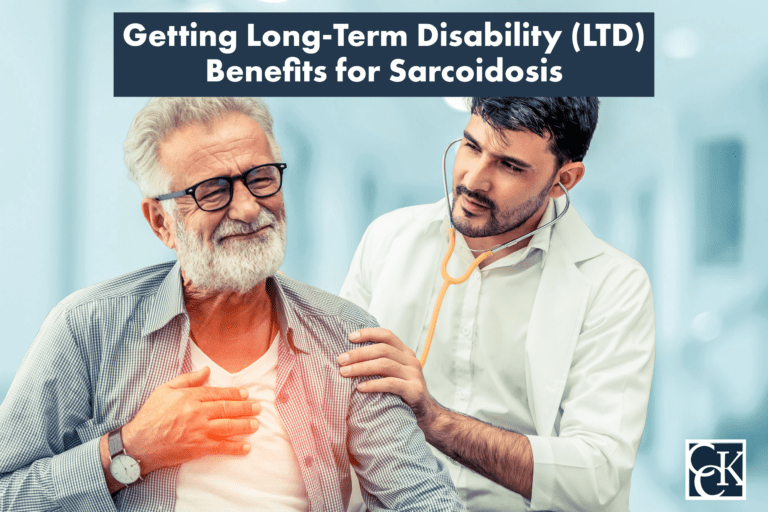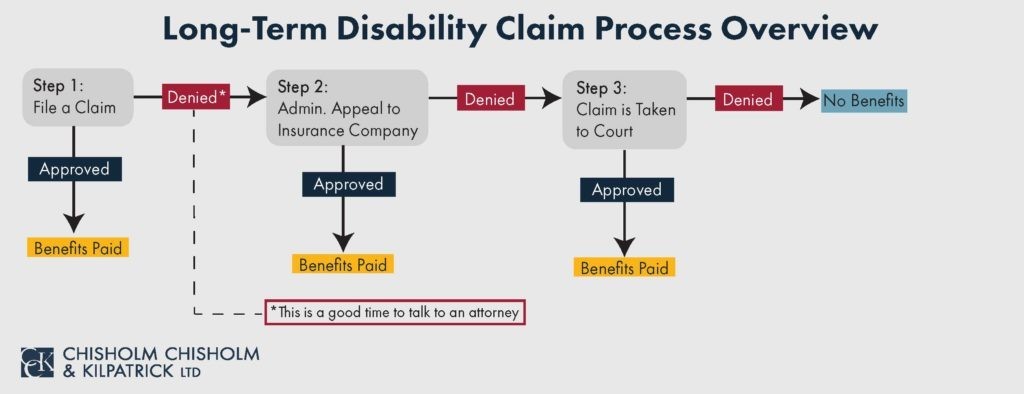Getting Long-Term Disability (LTD) Benefits for Sarcoidosis

Sarcoidosis is an inflammatory disease that occurs when growths of inflammatory cells called granulomas build up in an organ and cause it to malfunction. Once thought to be rare, sarcoidosis is now considered a common chronic illness, though it can be hard to diagnose. Sarcoidosis can affect nearly any organ in the body but occurs most commonly in the lungs. Interference with organ function can cause debilitating symptoms that may interfere with your everyday life.
If you have sarcoidosis and it is affecting your ability to work, you may be able to apply for long-term disability (LTD) benefits. These benefits will cover a portion of your work income. If you need assistance with your long-term disability claim, you can call Chisholm Chisholm & Kilpatrick today at 800-544-9144 for a free initial consultation.
What is Sarcoidosis?
The exact cause of sarcoidosis is unknown, but it is thought to be an immune response to foreign substances in the body, such as bacteria, viruses, chemicals, or dust. The presence of these substances may trigger the immune system to respond with the formation of a growth of inflammatory cells called granulomas on the afflicted organ. Granulomas may go away on their own, but if not, they may continue to clump, harden, or scar, which can affect the functioning of the organ to which they are attached.

Sarcoidosis most commonly affects the lungs, perhaps due to inhalation of chemicals and dust, but can affect almost any organ, including the heart, eyes, skin, and brain. Sarcoidosis can lead to breathing problems, vision loss, paralysis, fatigue and weakness, and chronic pain. In most cases, sarcoidosis affects the lymph nodes as well, which can cause uncomfortable swelling.
Sarcoidosis most commonly affects people from ages 20 to 40 and is thought to be genetic. There is no cure for sarcoidosis, but in many cases, it does go away on its own. When it does not, it can lead to lifelong complications and disabling symptoms
Symptoms of Sarcoidosis
Symptoms of sarcoidosis may depend on what organs are affected and may be slow to develop or become apparent. Sarcoidosis symptoms can also overlap with other diseases and illnesses, making the condition difficult to diagnose.
Sarcoidosis may begin with general symptoms such as:
- Fatigue
- Swollen lymph nodes
- Fever
- Weight loss
- Painful swelling of the joints
Most cases of sarcoidosis affect the lungs. Symptoms of sarcoidosis in the lungs may include:
- Persistent cough
- Shortness of breath
- Chest pain
- Wheezing
Other symptoms of sarcoidosis may depend on the affected organ. Various symptoms of sarcoidosis in other parts of the body may include:
- Night sweats
- Nausea
- Irregular heartbeat
- Swelling in legs
- Problems with vision
- Skin rashes or scaly skin
- Weakness in limbs
- Discoloration in nose, cheeks, lips, and ears
- Burning or itching eyes
- Fainting
Diagnosis and Treatment of Sarcoidosis
Sarcoidosis can be challenging to diagnose. In the early stages of the disease, few symptoms may present themselves, and when they do, they may be mistaken for other conditions or disorders. Your doctor will likely give you a physical exam and listen to your heart and lungs, check your lymph nodes for swelling, and evaluate any other physical symptoms, such as skin rashes, discoloration in the face, or weight loss.
Further testing for sarcoidosis may include blood and urine tests to assess your overall health as well kidney and liver function. Chest X-rays or a CT scan may be performed examine your lungs and heart. A PET scan or MRI may be used to scan the nervous system for sarcoidosis, and an eye exam may be administered if symptoms are affecting your vision. In some cases, a biopsy may be taken from the affected organ in order to evaluate it for granulomas.
Once you are diagnosed with sarcoidosis, it is possible for the condition to go away on its own. If it persists, however, it is often treated with medication. Medication for sarcoidosis typically starts with corticosteroids, a powerful anti-inflammatory drug often used for things like allergic reactions and asthma. In some cases, corticosteroids may be directly applied to the skin in cream form, or to the eyes using drops. Other medications may target more specific causes or areas of inflammation, as is the case with drugs that suppress the immune system.
Other treatments may also include physical therapy to improve muscle strength, pulmonary rehabilitation for your respiratory system, or the implantation of a pacemaker for your heart. If sarcoidosis has severely damaged your organs, organ transplant surgery may be necessary.
Sarcoidosis and Your Long-Term Disability Claim
Sarcoidosis can lead to disabling effects that can greatly impact your everyday life and your ability to work. To be approved for long-term disability benefits, you will need to prove that your sarcoidosis disables you from being able to carry out the duties of your job. It is important that you gather evidence that demonstrates specifically how your sarcoidosis impairs you.

Sarcoidosis can cause chronic pain and fatigue that can significantly inhibit your ability to work. Painful swelling of the joints or limbs can prevent you from performing physical activity, which can disrupt a physical job, make you unable to travel to your workplace, or hinder your ability to remain sitting or standing for too long.
If you have sarcoidosis of the lungs, difficulty breathing, chest pains, and persistent coughing can severely disrupt your physical and mental capacity to carry out the duties of your job. Other difficulties such as heart trouble, skin lesions, blurred vision, or painful inflammation around the eyes can also prevent you from being able to concentrate, complete tasks, or attend work altogether.
Treatment may also make it difficult for you to work. Medications can have troubling side effects and seeking treatment such as physical therapy or pulmonary rehabilitation can require that you take time out of work. More invasive treatments, such as the implantation of a pacemaker or organ transplant surgery, can require recovery time and adjustment before you can return to normal work duties. You will want to get all evidence that demonstrates the details of your specific sarcoidosis case and include it in your claim.
Chisholm Chisholm & Kilpatrick Can Help You with Your Long-Term Disability Claim
The long-term disability attorneys at Chisholm Chisholm & Kilpatrick can help you with your long-term disability claim for sarcoidosis. We understand that trying to manage a disabling condition is difficult while trying to file for long-term disability benefits. We have the experience and knowledge to help you with your claim or appeal.

Our long-term disability attorneys will evaluate your policy and determine the terms you need to meet in your policy’s definition of disability. We will assist you in gathering the strongest types of evidence to demonstrate how your sarcoidosis disables you. Our attorneys can act as a point of contact between you and your insurance company to ensure that all communications are handled correctly and that no deadlines are missed.
We know that medical records are often not enough to support your claim. CCK has a variety of professional contacts who may be able to perform additional evaluations to strengthen your case. We may also gather additional evidence from your physician, who may be able to provide a report of their own observations. They may also provide proof of the time you have taken out of work due to appointments or treatments. We understand that sarcoidosis can have a debilitating effect on your life, and we want to help lessen the burden of filing for long-term disability benefits.
Call CCK Today for a Free Consultation
Chisholm Chisholm & Kilpatrick is here to help you through every step of your long-term disability claim. Sarcoidosis can make completing the LTD process difficult to accomplish on your own, and we are able to alleviate some of the stress by handling the requirements of your long-term disability claim. Whether you are submitting an initial claim or are dealing with a denial of benefits, we are available to assist. For a free consultation with a member of our team, call us today at 800-544-9144.
Share this Post
